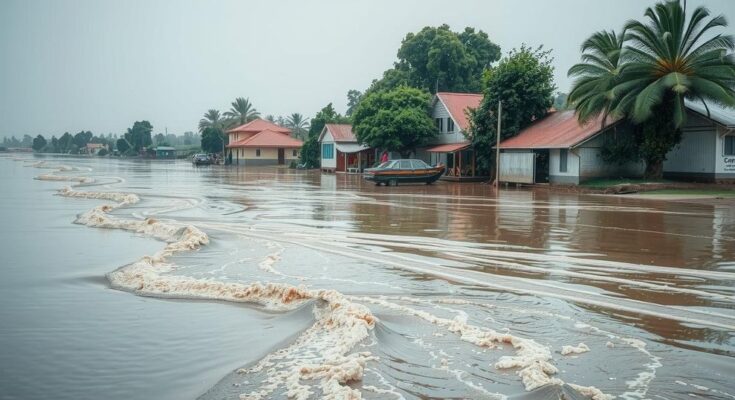The severe flooding of the River Nile has displaced over 379,000 individuals in South Sudan, leading to the submergence of villages and destruction of farmland. Communities are taking refuge along the Jonglei Canal, facing dire humanitarian needs amid the worsening impacts of climate change. The situation is exacerbated by conflicts and a lack of support systems, highlighting a critical vulnerability that these families must confront daily.
The overflowing of the River Nile has resulted in significant flooding, displacing over 379,000 people in South Sudan this year alone. Villages are submerged, farmland is destroyed, and livestock are perishing due to the relentless conditions. As families seek refuge in makeshift communities along the Jonglei Canal, the impact on their livelihood is profound. Seasonal flooding, exacerbated by climate change and the ongoing conflict in the region, has led to dire humanitarian needs, diminished food security, and an overwhelming reliance on aid. Local leaders express concern over the lack of infrastructure and services in these new settlements, highlighting the struggle of the indigenous pastoral communities to adapt to the changing landscape.
In Pajiek, new residents like Bichiok Hoth Chuiny describe their suffering and the loss of their homes due to flooding. The World Bank emphasizes that South Sudan is particularly vulnerable to climate change’s impacts, exacerbated by an insufficient ability to cope with such disasters. Compounding these challenges, the Jonglei Canal, initially envisioned as a means to manage floodwaters, serves currently as a refuge. However, the situation remains grim as health services and infrastructure are inadequate, further endangering the displaced communities, who continue to face the looming threat of hunger and health crises.
South Sudan has been grappling with recurrent and severe flooding, which has recently intensified due to the overflow of the River Nile. This phenomenon has led to the submergence of entire villages, the ruin of agricultural lands, and the death of livestock. The worsening flooding patterns can be attributed to climate change, the opening of dams upstream, and ongoing internal conflict that has left the nation vulnerable and lacking resources. Pastoral communities, which historically managed seasonal floods, now face an existential threat to their way of life and survival as they adapt to increasingly challenging environments.
The recent flooding from the River Nile has forced thousands in South Sudan to endure severe hardships, leading to widespread displacement, loss of livelihood, and increased reliance on humanitarian aid. The lack of infrastructure and inadequate health services in newly formed communities deepen the crisis for those affected. As South Sudan continues to confront the realities of climate change and civil unrest, the resilience of its people is tested as they navigate an uncertain future amidst these ongoing challenges.
Original Source: www.the-independent.com




